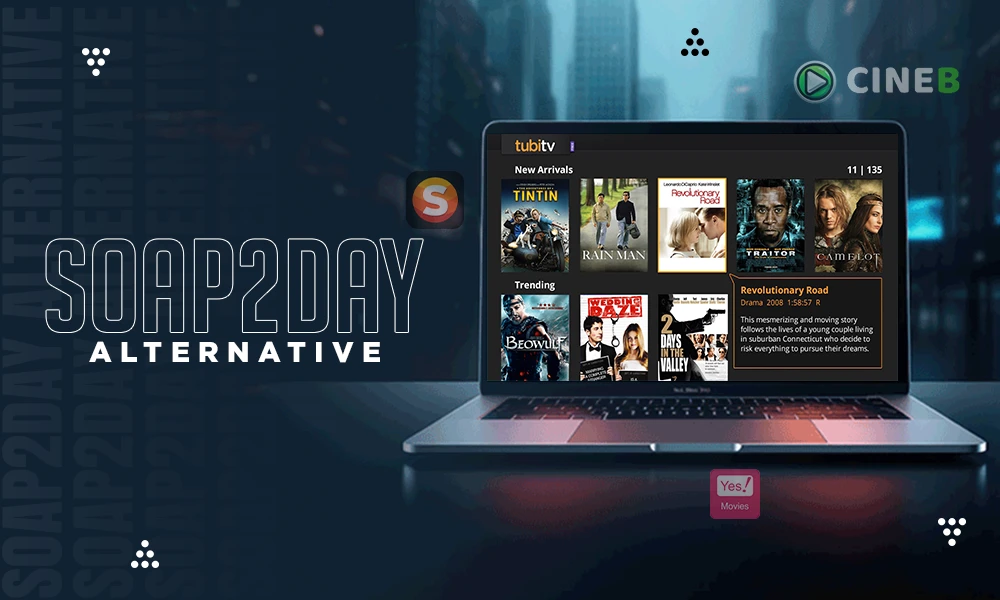Soap2Day: The Rise and Fall of a Popular Streaming Platform
Soap2Day was once a highly popular website that offered users free access to movies and television shows, attracting millions of visitors worldwide. However, the platform’s widespread success was marred by legal issues, as it operated without the proper distribution rights. Over time, Soap2Day gained a reputation not only for providing free entertainment but also for its association with piracy and potential security risks for its users. In this article, we’ll explore the history of Soap2Day, its rise to prominence, the legal concerns surrounding it, and the eventual downfall of the platform.
1. What is Soap2Day?
Soap2Day was an online streaming website that allowed users to watch a wide variety of movies and TV shows without the need for subscriptions or payments. From recent blockbusters to classic TV shows, the platform quickly became a go-to for people looking for free entertainment. Its ease of use, vast catalog, and no-cost model contributed to its rapid growth and popularity, especially among users who did not want to pay for premium streaming services like Netflix, Hulu, or Disney+.
Despite its popularity, Soap2Day operated in a legal gray area by distributing copyrighted content without proper licenses or authorization. This led to many concerns, especially around the legality of using such a service and the security risks it posed to users.
2. How Did Soap2Day Gain Popularity?
Soap2Day rose to prominence around 2018-2019, a time when streaming services were proliferating, but access to free content online was becoming increasingly restricted due to stricter enforcement of anti-piracy laws. Users were drawn to the platform because of its extensive library of movies and shows, which were often available shortly after release. For those who didn’t want to pay for multiple streaming subscriptions, Soap2Day offered a convenient alternative.
Another factor in Soap2Day’s success was its simple and intuitive interface. Unlike many illegal streaming sites that bombarded users with aggressive ads or confusing layouts, Soap2Day maintained a relatively clean design, making it easy for visitors to find and stream content. The platform also didn’t require users to create accounts or provide personal information, which contributed to its appeal.
3. Legal Issues and Piracy Concerns
The biggest issue surrounding Soap2Day was its illegal distribution of copyrighted content. Like many other free streaming websites, Soap2Day did not have the legal rights to stream or distribute the films and TV shows it hosted. This meant that while users were enjoying free access to popular entertainment, they were unknowingly engaging in an illegal activity—watching pirated content.
This kind of activity poses significant financial risks to the entertainment industry, as it deprives creators, production companies, and distributors of revenue. As a result, copyright holders, law enforcement agencies, and internet service providers began targeting websites like Soap2Day, issuing cease-and-desist orders and taking legal action to shut them down.
Users of Soap2Day also faced potential legal risks, as viewing pirated content can sometimes lead to legal consequences, depending on a country’s laws. In addition to legal concerns, there were security risks associated with visiting such sites. Many illegal streaming platforms are rife with ads that contain malware or malicious links, and users often unknowingly expose their devices to security threats.
4. The Downfall of Soap2Day
Soap2Day’s success was ultimately short-lived. As the platform continued to grow in popularity, it attracted increased attention from legal authorities and copyright holders. Several anti-piracy organizations took action against Soap2Day, leading to its repeated shutdowns. However, much like other illegal streaming platforms, Soap2Day’s creators often resurfaced the site under different domain names, making it difficult to permanently take down the service.
By 2021, law enforcement agencies and internet service providers had begun blocking access to Soap2Day in several countries, effectively limiting its reach. The site’s main domain was taken offline multiple times, and users were warned of the legal and security risks associated with using the platform. Eventually, Soap2Day’s creators abandoned the project, and the website ceased operations.
Despite the official shutdown, mirrors and clones of the site have appeared, as is often the case with popular piracy websites. These copies, however, are unreliable and frequently laden with malware, making them dangerous for users who continue to seek out free streaming services.
5. The Impact on Streaming and Piracy
Soap2Day’s rise and fall highlighted the persistent demand for free online streaming options and the ongoing battle between piracy websites and copyright enforcement. While legitimate streaming platforms like Netflix, Amazon Prime, and Hulu continue to dominate the market, the high cost of subscriptions and the fragmented nature of the streaming landscape have led some users to seek out free alternatives.
The entertainment industry has had to adapt by increasing efforts to crack down on illegal streaming sites and promoting legal alternatives. This includes offering more affordable subscription tiers, bundling services, and making content available in more regions.
6. Alternatives to Soap2Day
For users who want to enjoy movies and TV shows legally without paying a high price, there are several alternatives to Soap2Day. Many streaming services now offer free or ad-supported tiers, including:
- Crackle: A free streaming platform offering movies and TV shows with ads.
- Tubi: A free, ad-supported service with a vast catalog of films and TV shows.
- Pluto TV: Provides both live and on-demand content without a subscription fee.
These platforms offer legal ways to watch content without the risks associated with illegal streaming sites like Soap2Day.
Conclusion
Soap2Day’s popularity was driven by the desire for free entertainment, but it ultimately fell due to its illegal nature. While it offered convenient access to movies and TV shows, the platform operated outside of copyright laws, leading to its eventual shutdown. Today, users are better served by legal alternatives that provide affordable or ad-supported content, allowing them to enjoy entertainment without the legal and security risks associated with piracy.














Post Comment